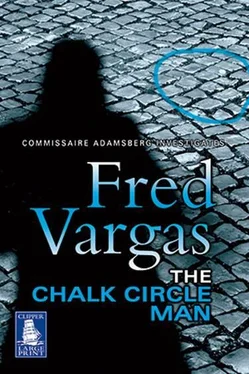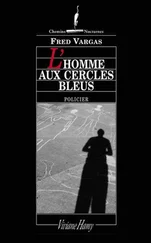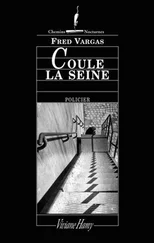Adamsberg had gone home to wait for a call from Mathilde Forestier. The day had started out typical of the aftermath of a murder, a day of silent, sweaty activity by the lab technicians, of stuffy offices with plastic cups all over the tables. The graphologist had arrived and had started delving into the piles of snapshots taken by Conti. And over it all loomed a sort of trembling, of apprehension perhaps, into which this out-of-the-ordinary event had thrown the 5th arrondissement police station. Whether it was the apprehension of failure, or the apprehension of a weird and monstrous killer, Adamsberg had not tried to work out. To escape having to witness it all, he had gone for a walk in the streets all afternoon. Danglard had stopped him at the door. It wasn’t yet midday, but Danglard had already had too much to drink. He said it was irresponsible to walk out like that, on the day they’d had a murder. But Adamsberg couldn’t admit that nothing removed his powers of thought so effectively as watching a dozen other people thinking. He needed the temperature at the station to drop, it was probably an undulant fever anyway, and it was essential that nobody should be expecting anything from him for Adamsberg to be able to harness his own ideas. And for the moment the suppressed excitement in the police station had scattered his ideas all over the place, like panicking soldiers in the thick of the battle. Adamsberg had long ago noted that when there are no combatants left, the fighting stops, so when he had no ideas he stopped working and didn’t try to winkle them out of the cracks to which they had retreated. It had always turned out to be a waste of time.
Christiane was waiting at his front door.
Just his bad luck. This was one evening when he would have preferred to be alone. Or else perhaps to spend the night with his neighbour, a young woman whom he had met several times on the stair and once at the post office, and who was definitely appealing.
Christiane announced that she had come from Orleans to spend the weekend with him.
He was wondering whether the young neighbour, when she had given him that look at the post office, had meant ‘I’d like to go to bed with you’ or ‘I’d like a chat, I’m bored.’ Adamsberg was a docile man. He tended to go to bed with any girl who wanted to: sometimes that seemed exactly the right thing to do, since it apparently kept everyone happy, other times it seemed pointless. But in any case, there was no way of knowing what it was that the girl downstairs had wanted to convey to him. He had tried thinking about that, but had put it off until later. What would his youngest sister have said? His little sister was a powerhouse of thought, enough to drive him mad. She gave her opinion of any girlfriend of his she met. Of Christiane, her judgement had been: ‘B minus. Lovely body, very entertaining for an hour, medium-serious brain, centripetal mind with concentric thoughts, three key ideas, gets bored after a couple of hours, goes to bed, is extremely self-denying and biddable in love, same again next day. Overall verdict: don’t get hooked, move on if a better prospect turns up.’
But that wasn’t why Adamsberg wanted to avoid Christiane that evening. Perhaps it was because of the look that girl in the post office had given him. Perhaps it was simply because he had found Christiane waiting for him, so sure that he would smile when he saw her, so sure that he would open the door, and then unbutton his shirt, and then turn down the sheets, and so sure that she would be making the coffee in his kitchen next morning. Absolutely confident of all that. Whereas for Adamsberg, the more certain other people’s expectations were of him, the more oppressed he felt. It gave him an irresistible urge to disappoint them, to let them down. And then again, he had been thinking a bit too much about his petite chérie lately, and would go on doing so, on the slightest pretext. Especially since he had realised during his walk that afternoon that it was nine years now, not eight, since he had last seen her. Nine years, good God! And all at once it had seemed to him that this wasn’t normal. He had felt alarmed.
Until now, he had always imagined her travelling the world, in a yacht with some flying Dutchman perhaps, or riding a Berber camel, learning to throw a spear under the guidance of an African tribesman, eating croissants in the Café des Sports et des Artistes in Belleville, or chasing cockroaches in a hotel bedroom in Cairo.
But today he had imagined her dead.
Adamsberg had been so shaken that he had stopped for a cup of coffee, his forehead burning, sweat running down his temples. He visualised her lying dead, having died some time ago, her body decomposing under a tombstone, and in the grave alongside her the little bundle of bones belonging to Richard III. He had tried to summon up images of the Berber camel-handler, the Dutch yachtsman and the café owner in Belleville. He had begged them all to help him reanimate her as usual in front of his eyes, to work the strings and make that tombstone vanish. But damn them all, these characters wouldn’t let themselves be summoned up. Leaving the way clear for this deathly fear to grip him. Dead, dead, dead, Camille dead. Yes, surely dead. And he had been imagining her alive all this time, even if she had been unfaithful to him with other men, just as he had been unfaithful to her with other women, even if she had expelled him from her thoughts, even if she was stroking the shoulders of the bellhop in the bed in the Cairo hotel, after he had come to her room to get rid of the cockroaches, even if she was taking photographs of all the clouds in Canada – because Camille collected clouds that looked like people’s profiles, which were not easy to come by – and even if she had forgotten Adamsberg’s face and his name, just so long as Camille was alive somewhere in this world. Because if so, everything was all right. But if Camille had died somewhere or other in this world, then everything was not all right at all. In that case, what point would there be any more in getting up in the morning and busying oneself, if she were dead, Camille, the unlikely offspring of a Greek god and an Egyptian prostitute (for that was how he saw her origins)? What would be the point after that of bothering to track down murderers, or counting the spoonfuls of sugar in his coffee, or going to bed with Christiane, or looking at the stones in every street, if Camille wasn’t somewhere on the planet, making life vibrate around her with her combination of seriousness and frivolity, the seriousness reflected on her forehead, the frivolity on her lips which met together in a perfect figure of eight, an image of the infinite? And if Camille was dead, Adamsberg would have lost the only woman who had said to him quietly one morning: ‘Jean-Baptiste, I’m going to Wahiguya. It’s on the upper reaches of the Volta.’ She had disentangled herself from his arms, had said ‘I love you,’ dressed, and left. He had thought she was going out to buy bread. But she had not come back, his petite chérie . Nine years. He wouldn’t have been entirely misleading anyone if he had said to them ‘Yes, I know Wahiguya, I even lived there for a while.’
And on top of everything, here was Christiane, quite certain that she would be making the coffee for him in the morning. While the petite chérie had died somewhere without his being able to do anything about it. And now, one day, he would die himself, without ever seeing her again. He imagined that Mathilde Forestier might be able to pull him out of this black depression, even if that wasn’t the reason he was trying to find her. But he did hope that when he saw her the film would start again, from the right moment, with the bellhop in the Cairo hotel.
Mathilde did telephone.
Читать дальше












